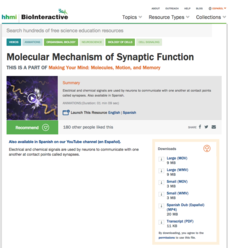SciShow
Why These Squirrels Destroy Their Brains Every Winter
It seems like a terrible idea to destroy and rebuild your own brain, but that is exactly what some ground squirrels are doing all winter long.
SciShow
Does a Bigger Brain Make You Smarter?
In some cartoons, the one with a bigger brain is often described as "smart," but is it true in real life?
Crash Course
The Chemical Mind - Crash Course Psychology
BAHHHHHH! Did I scare you? What exactly happens when we get scared? How does our brain make our body react? Just what are Neurotransmitters? In this episode of Crash Course Psychology, Hank takes us to the simplest part of the complex...
SciShow
Why These Squirrels Destroy Their Brains Every Winter
It seems like a terrible idea to destroy and rebuild your own brain, but that is exactly what some ground squirrels are doing all winter long.
Bozeman Science
The Nervous System
Paul Andersen begins this podcast with a discussion of brain lateralization and gives a brief demonstration of tests that were performed on split-brain individuals. He then discusses the major parts of a neuron and explains how action...
TED-Ed
TED-ED: How do drugs affect the brain? - Sara Garofalo
Most people will take a pill, receive an injection, or otherwise take some kind of medicine during their lives. But most of us don't know anything about how these substances actually work. How can various compounds impact the way we...
SciShow
Your Brain is Plastic
Hank explains the gift that your brain gives you every day: the gift of neural plasticity -- the ways in which your brain actually changes at the cellular level as you learn.
SciShow
Why Is It So Hard to Remember Things Right Now?
If you feel like you’ve been more forgetful than normal recently, you’re definitely not alone. Your memory can have a lot to do with what's happening around you.
Bozeman Science
The Neuron
In this video Paul Andersen explains the basic anatomy of a neuron; including the dendrites, cell body, axon hillock, axon, and axon terminal. He also describes how neurons are classified both structurally and functionally.
SciShow
Your Brain is Plastic
ank explains the gift that your brain gives you every day: the gift of neural plasticity -- the ways in which your brain actually changes at the cellular level as you learn.
SciShow
Does Alcohol Kill Brain Cells?
Quick Questions explains what alcohol does -- and doesn’t do -- to your brain cells. Enjoy this episode responsibly!
Curated Video
Snowflakes
How are snowflakes formed in such a dizzying array of patterns? Material processes - Solids, liquids and gases - Characteristics of water Learning Points Liquid water freezes at 0°C. The shape of a snowflake is changed at different...
Neuro Transmissions
The Black Stain That Changed Neuroscience
There’s a black stain on the history of neuroscience. But don’t worry, that’s actually a good thing! Thanks to Camillo Golgi’s mysterious “black stain” and Santiago Ramon y Cajal’s artistic talents, starting in the early 1900s, we...
The Noted Anatomist
Nicotinic cholinergic receptors
This video tutorial discusses the Nicotinic cholinergic receptors: 0:00. Intro 0:17. What are cholinergic receptors? 0:31. What are nicotinic receptors? 1:47. What are the 2 types of nicotinic receptors? 2:07. Nm. Nicotinic muscle...
Neuro Transmissions
Does Alcohol Kill Brain Cells?
Alcohol is a double-edged sword. Benjamin Franklin once said, "Beer is proof that God loves us and wants us to be happy." However, some people say that drinking three beers means losing 10,000 brain cells. But is it true that alcohol...
Curated Video
002 An Introduction to Neurons
BioVid Episode 2 - An Introduction to Neurons. In this video, I talk about what a neuron is, the parts of a neurons and then talk about the three types of neurons.
Science360
Thinking Brain - Mysteries of the Brain
Through neural connections, called synapses, the brain can process and store enormous amounts of information. Neuroscientist Gary Lynch at the University of California, Irvine explains how this incredibly complex communication process...
Catalyst University
Anatomy - Parts of a Neuron (with Microscope Image)
In this video, we look at the parts of a neuron (both artist's rendition and microscope image) and neuroglia.
Curated Video
Muscle Memory: How the Brain Learns and Retains Skills
Muscle memory actually takes place in the brain, not our muslces. It's a useful process our brains go through to remember how to do tasks we've done many times before. Learn how muscle memory is formed.
Neuro Transmissions
What is a Neuron?
The neuron. It is perhaps the most important cell in the human body. We have billions in our body and together they form a superhighway that sends information throughout our mind and body. But can you name the different parts? Alie...
ProEdify
The Neuron: Building Blocks of the Nervous System
This video provides an overview of the structure of neurons, the primary cells of the nervous system, and how they come together to form a network. It explains the key components of a neuron, such as the cell body, dendrites, axon, and...
Curated OER
Nervous Systems
Explore the nervous system's workings by first looking at the brain and its two hemispheres. Using the example of a split-brain surgery done for epilepsy, the function of language and vision is shown with an interactive component. Paul...
Howard Hughes Medical Institute
Molecular Mechanism of Synaptic Function
Neurons don't touch each other, but they still communicate. Observe the process of both electrical and chemical signals used by neurons to share information. Hear exactly what triggers each step of the reaction as you view an animation...
TED-Ed
What Does Lead Poisoning Do To Your Brain?
Despite government regulations and improved housing quality, lead poisoning is still an issue today. But what are the implications of lead exposure to a person's brain and neural activity? Learn more in a video that uses animation to...



